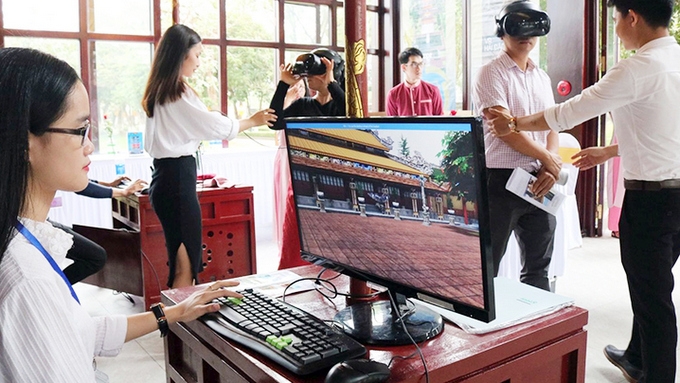Due to the impact of COVID-19 pandemic, the tourism sector in the central region has had to apply digital technology towards tourism restoration and development in the localities.

Tourists are guided to visit Hue Imperial Palace via virtual reality technology. (Photo: Dong Van)
Based on demand and resources, several localities have invested in infrastructure, building a digital database system for the tourism industry and developing smart tourism applications.
The Vietnam Tourism Advisory Board (TAB) has conducted a survey of the needs and trends of tourists during the COVID-19 period. The results showed that 40% of the respondents said that they wanted to book tours online, while only 12-15% still book tours through travel agencies. The figure proved that consumers have turned to digital platforms to save time, facilitate transactions and limit contact. Therefore, localities with potential for tourism have been forced to boost digital transformation and apply information technology to catch up with the trend. Technology enterprises should also seize the opportunity and coordinate with localities to develop more technological products and services.
Hoang Quoc Viet, General Director of the Vietsoftpro Company, said that in recent times, the company has built many digital tourism products to support Thua Thien Hue province, such as automatic voiceovers in 12 languages and virtual tour assistants at attractions under Hue’s heritage system as well as 3D maps of cultural heritage resources. The products have received positive feedback from visitors on their convenience and overall experience. Social networking platforms such as Zalo, Facebook and Tiktok have been used to effectively support the local tourism industry in its communication and promotion of tourism businesses and products via digital platforms. By the end of April 2021, the official account of Thua Thien Hue Department of Tourism had attracted more than 18,000 followers and 130,000 likes although it is only just in its pilot phase.
Director of Phong Nha Explorer Company Tu Thanh Hai also noted that in recent years, the company has realised the importance of technology and digital transformation, especially in reducing human resources while still benefitting from the number of domestic and international visitors to Quang Binh province, notably Phong Nha – Ke Bang National Park, via its official website. Therefore, Phong Nha Explorer’s website was designed in a friendly and interactive tool to help customers know more about products and book tours easily. The online operation also helps reducethe cost of headquarters, people, office and administrative procedures, thereby reducing service costs and bringing benefits to both enterprises and customers.
Central localities agree that the success of digital transformation in tourism requires the determination of agencies at all levels as well as the responsibility and efforts of enterprises, organisations and local authorities. This digital transformation must be conducted in management and promotion activities; therefore, the whole tourism sector, from management agencies to enterprises, should seek innovation both in their thinking and action.
Vice Chairman of Thua Thien Hue Provincial People's Committee Nguyen Thanh Binh said the province is determined to develop its tourism in a smart and sustainable manner, focusing on promoting digital transformation. In the near future, the locality will enhance its investment in infrastructure, develop a digital database system for the tourism industry, and develop applications to connect information management systems from central to the grassroots levels. The province will cooperate with information technology businesses to develop smart apps to serve tourists. In addition, start-ups in digital tourism will be supported; meanwhile, tourism human resources will be trained with the necessary skills to effectively use digital technology.
Director of Da Nang City Department of Tourism Truong Thi Hong Hanh also shared that the city is restructuring its tourism products in accordance with the new situation and promoting digital transformation in 2021. Accordingly, digital transformation will be enhanced in State management, business activities and services. The city will also turn to smart tourism forms while providing visitors with virtual reality experiences and a variety of e-tourism services.
Many technology experts note that it is crucial to set out synchronous measures to better meet the needs of tourists. In particular, the travel credit card model with its payment feature using QR Code for services such as hotel booking, light ticket booking, bus ticket booking, dining table reservation at tourist attractions and purchasing online products will be a major trend in the digital tourism industry.
To promote the use of smart travel cards, localities need to deploy QR code payment acceptance points, thereby forming a payment platform for visitors. In addition, it is necessary to develop a tourism social network that links tourists and service providers, creating a digital environment that helps businesses move closer to tourists. In the long term, localities should improve their digital payment infrastructure to fully meet the needs of visitors and expand payments using cards and online payment channels.
Ninh Co
Translated by NDO